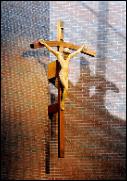The Holy Eucharist is a sacrament and a sacrifice. In the Holy Eucharist, under the appearances of bread and wine, the Lord Christ is contained, offered, and received.
The whole Christ is really, truly, and substantially present in the Holy Eucharist. We use the words "really, truly, and substantially" to describe Christ's presence in the Holy Eucharist in order to distinguish Our Lord's teaching from that of mere men who falsely teach that the Holy Eucharist is only a sign or figure of Christ, or that He is present only by His power.
After the substance of the bread and wine had been changed into Our Lord's body and blood, there remained only the appearances of bread and wine. Because the appearances of bread and wine remain in the Holy Eucharist, we cannot see Christ with our bodily eyes in this sacrament. We do see Him, however, with the eyes of faith. Our bodily eyes, moreover, do not deceive us when they see the appearances of bread and wine for these appearances really remain after the Consecration of the Mass.
By the appearances of bread and wine we mean their color, taste, weight, shape, and whatever else appears to the senses. The change of the entire substance of the bread and wine into the body and blood of Christ is called Transubstantiation. Jesus Christ is whole and entire both under the appearances of bread and under the appearances of wine.
The Catholic doctrine of the Holy Eucharist contains many mysteries. It is beyond our comprehension how the same living Christ who is in heaven should also be on earth, in every place where the Holy Eucharist is consecrated. We cannot understand how the body of our Savior with its full stature can be present beneath the small host. We cannot attempt to explain how our Divine Redeemer can be present, whole and entire, in the smallest portions of the consecrated species of bread and wine, although we have some resemblance to this miracle in the presence of our entire soul in every portion of our body.
But we have the statement of Our Lord Himself for the truth of these mysteries and hence it is our duty to believe them without hesitation. When Our Savior first announced the doctrine of the Holy Eucharist to His followers, some of them would not believe. They said: "This is a hard saying, who can listen to it ?" (John, 6, 62), and some of them even left Him forever. Today there are many persons in the world who say that the doctrine of the Real Presence is too hard to believe, and claim that the Eucharist is only bread and wine representing Christ. But Catholics accept the words of Our Lord Himself who said: "This is my body . . . this is my blood," and adore Him as truly present in the Holy Eucharist.

